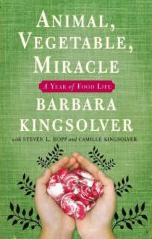
 Animal, Vegetable, Miracle
Animal, Vegetable, MiracleA Year of Food Life
Reviewed May 13, 2008.
Crown Publishers, New York, 2005. 249 pages.
Starred Review.
2008 Sonderbooks Stand-out: #1 Nonfiction, True Stories
Barbara Kingsolver has a marvellous ability to make you think. She has a way with words, coupled with ideas that challenge today’s society.
In Animal, Vegetable, Mineral, Barbara Kingsolver and her family became locavores –attempting to eat food that comes from the local area, rather than food that had been shipped hundreds or thousands of miles to reach them.
Along the way, she tells us about the journey, drawing us into her story as only Barbara Kingsolver can.
Her daughter provides the book with recipes, and her husband provides sidebars of information about such things as the food industry’s dependence on petroleum.
She sets up the book going through each month of a year, beginning in late March, ready for asparagus. The whole concept of certain foods being available in certain seasons is one that I, along with most American consumers, am not used to. She writes about their garden and farm adventures in each season of the year, and her daughter provides recipes to go with each month’s particular abundance.
Barbara Kingsolver can make thought-provoking entertainment about anything, from locking your house to make sure no one gives you zucchini to breeding turkeys. (Are there any turkeys left that know how to sit on a nest? They don’t need to in modern America, where they are bred to be hatched from incubators and sit in a small, enclosed space.)
It was unfortunate reading this book in the winter, because I, unlike the Kingsolvers, had not stored up fresh food to tide me over. However, in May the local farmer’s market will start up, every week right next to my workplace. I will look at the food being offered with completely new eyes. In fact, reading this book opened my eyes to the small labels in my grocery store produce section, telling which foods come a relatively short distance.
Most of all, this book made me hungry! All the descriptions of fresh food, grown without pesticides and not shipped thousands of miles convinced me to think about trying this approach not as some sort of noble sacrifice to help the environment, but to partake in some of the deliciousness described.
